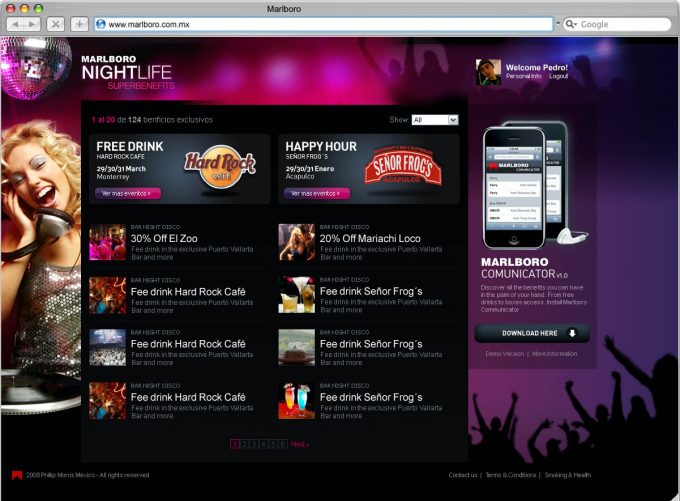Towards a new attention economy
12 years ago, in 2008, we worked for Philip Morris creating products that worked behind strict user registration. Social networks were just gaining strength but it was already sensed that they were going to provoke a paradigm shift on the Internet. For our part, we began to perceive that there was something more than a typical marketing campaign every time we put together an action with loyal users. That made us think that brands in general were going to play a very important role in the production of quality content (interesting) to attract their own audience. They were basically going to have their own means. This is how we expressed it at that time:

What is an Internet Campaign?
In the digital world, an advertising campaign can be a smartphone app, a game, a community action; or all that at once. Unlike the analog world – where campaigns begin and end with their pattern – very often these digital communications produce true communities of users that culturally appropriate them.
Let’s imagine a brand that makes an advertising action-site called: “Guide to the summer scene of the Argentine coast.” This hypothetical guide will surely have tools for community participation, users will be able to interact with each other and will end up generating the true editorial content of the Guide. If the site is successful, a consistent community of Guide users will be formed. Let’s call this result “Digital Property.”
At this point we can ask ourselves the following questions:
• What is the brand´s role and strategy on the Internet once the campaign is over?
• Should the community space be terminated?
• Should it be abandoned, or should it move to a sponsoring instance of that community that at some point is already independent from the brand and the campaign?
• Will we have to continue cultivating the site?
• What repercussions can one or another action have on users loyal to the brand and the action?
If we chose to continue cultivating Action-Site-Property we would soon realize that the brand’s competition has expanded. Now that brand or product will not only find itself competing with similar products, but also with companies that are dedicated to developing content, in this case Guides. So, would it be worth moving forward?
Taking into account the budgets that brands manage for their actions, we can infer that they will almost always be in an advantageous position against “digital publishers”. In other words, a brand could emerge with a relative advantage as a new permanent player in the publishing and entertainment market.

Thinking about it that way, brands would then have the possibility of setting up not only a temporary action and then abandoning that community of users as is usually done now, but could also include within their perspectives the possibility that their actions become a very important asset. And new to the company. What are Nike Marathons? Why should companies create digital properties? Because it is logical! Because it is what they have been doing for years. A game, an application, a meeting place that is seen by users / customers as something of “real value” is a benefit, a gift. The fact that it is digital does not diminish its value. It is a benefit, period. (But how would we explain the FarmVille phenomenon on Facebook?)
Wouldn’t it be logical that instead of using Excel we would use a spreadsheet provided by our bank, which is not only an improved version of the current application, but also more secure, with remote access and with dynamic information on our accounts?
Who should develop the best soccer game on Facebook? A software company, an entrepreneur, or Adidas?
All this raises a new question. Who are the providers of the “new” advertising campaigns based on games, applications, community administration, communication via digital publishers … etc?
The answer is: Anyone who knows how to do it! And usually they are not the advertising agencies since they are still attached to the traditional model. In this new scenario, all those companies (or individuals) that know how to develop and manage the digital properties that are going to be generated by the companies come into play. The Internet tends to horizontalize everything it touches and advertising will not remain outside this law.
In this new scenario, a new family of competitors will emerge for advertising agencies. They will surely be companies that developed internet products, online gaming companies, individuals with ideas and production capacity and anyone who understands and finds a new possibility within the spectrum of digital products.
We can also imagine a new role for the brand´s marketing areas -which will require new skills-, that of detecting market opportunities. What company would not have bought Taringa 4 years ago for $ 5,000? (Now it’s worth $ 20 million). What does it matter if it is a site or a campaign or a viral or an application?. Taringa has 3,000,000 unique visitors per day! It has real people, it has the community. It’s the media! In a “non-interruptive” advertising scenario, won’t the same companies have to guarantee their audience?
We imagine in the not too distant future that brands will be the new “investment funds” for new Internet ideas. And when that happens the current agency / business / media ecosystem will change forever.